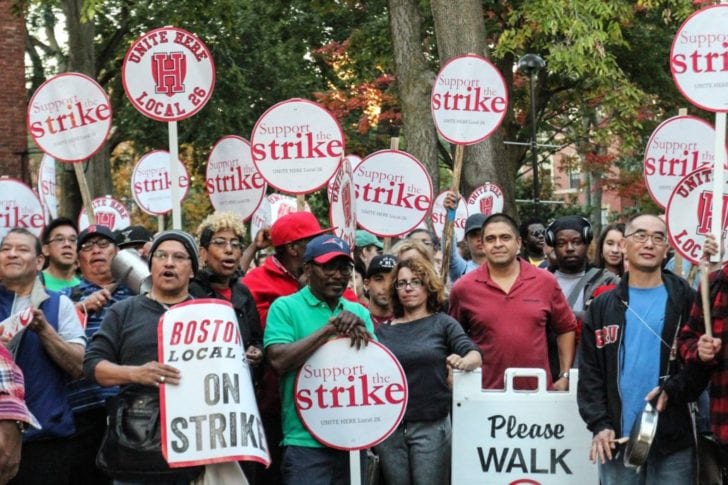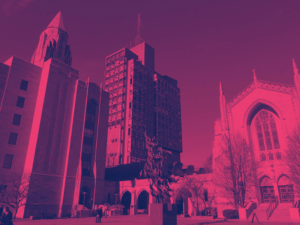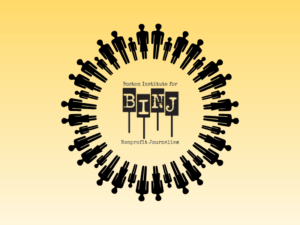
October 24, 2016
BY JASON PRAMAS @JASONPRAMAS
Three weeks into their strike, Harvard University dining hall workers are in a difficult position. Their union’s demands for better wages, benefits, and working conditions are falling on deaf ears in the Harvard administration. They cannot continue picketing indefinitely on $200 weekly strike pay—which itself won’t last for long … and the bosses know it.
That same administration talks about the situation as if the workers are already overpaid since they make wages higher than the industry standard. Even though college food service workers generally get low pay with few benefits by convention. It tries to make the Harvard dining hall workers union, UNITE HERE Local 26, look greedy by asking for more, when all the workers want is a living wage to be able to survive the increasingly insane costs of living in Greater Boston. And a health care package that doesn’t raise their out-of-pocket costs. Which other Harvard unions have already agreed to, sadly.
This despite the fact that Harvard has an unbelievably massive $35 billion endowment. The largest amount held by any institution of higher learning in the world. Larger than the annual budgets of many nations. The school’s endowment page makes it clear that its administration knows that making any pitch for sympathy on labor costs is ludicrous on its face (although that’s precisely what they do when they attack the dining hall workers’ extremely moderate demands as somehow unaffordable). In a section of that page entitled “Why can’t Harvard use more of its endowment in order to cover additional expenses or reduce tuition costs?” the following logic is offered:
Endowment gifts are intended by their donors to benefit both current and future generations of students and scholars. As a result, Harvard is obligated to preserve the purchasing power of these gifts by spending only a small fraction of their value each year. Spending significantly more than that over time, for whatever reason, would privilege the present over the future in a manner inconsistent with an endowment’s fundamental purpose of maintaining intergenerational equity.
A statement worthy of a CEO or banker. Or neoliberal ideologue. Basically saying, We can’t spend more money from the endowment because we don’t want to touch our principal and lower our profits. Funny attitude for a supposed nonprofit. One that’s unfortunately being emulated at colleges around the country as the privatization of higher education continues apace.
Since Harvard is unwilling to spend down its endowment by even a tiny percentage to ensure all its employees receive truly fair wages and benefits, it’s all the more imperative that dining hall workers continue to press their demands. And that more people support them.
Because not only is Harvard screwing its own food service staff while amassing wealth beyond the dreams of avarice, it is also doing grievous damage to the Massachusetts public higher education system. Which raises the stakes considerably. And links the problems of one group of working people to the fortunes of the working families of an entire state. For whom shaking the edifice of Harvard’s endowment must become a central political concern.

Image via Boston’s Local 26
Understanding Harvard’s finances is the key to apprehending why the university’s very existence is problematic in a democracy—and a clear and present danger to the state public higher education system. And to answering the central question: Why is an institution of higher learning allowed to run like a multinational corporation? Socking away funds that it possesses mainly because it educates the children of the one percent—scions of powerful families who steal money from the rest of us in myriad ways and then donate part of that money back to the supposedly nonprofit school in exchange for income tax breaks. A school not required to pay taxes on its vast income by dint of that nonprofit status. Which then also takes huge amounts of public funds despite being a private school.
It’s also worth asking why Harvard is not a public college. Why is it not UMass Cambridge? Harvard was, after all, originally part of Massachusetts state (and colonial) government. Yet over the centuries it was able to reorganize itself as a private nonprofit school, and essentially write the rules it plays by.
But for a “private” school it’s certainly awash in public money. A brief review of how Harvard enthusiastically drains government coffers that it refuses to replenish should make it painfully obvious that it is indeed a public university. And therefore in dire need of democratic reform to better align its mission with the needs of the Mass public higher ed system.
First, all the funds in the Harvard endowment, and all the money it makes from financial investments, is not taxed. Neither is all the property Harvard owns—on which it famously expends small “Payments in Lieu of Taxes” (PiLoTs) instead of much higher property taxes. According to Slate, a report by Nexus Research and Policy Center—a right-wing pro-corporate think tank that I would normally avoid citing—does some sloppy math that nevertheless helps us think more clearly about the magnitude of the problem with giving private schools nonprofit status. The report says that, in 2014, Harvard made the equivalent of $48,000 in tax savings from federal, state, and local governments for each of its students. Many of whom can definitely afford to pay full freight on their education. While predominantly working and middle class Massachusetts public college students are educated in woefully underfunded state institutions. The Nexus report indicates that UMass Amherst—the Commonwealth’s flagship university— made only the equivalent of $9,900 in tax savings for each of its students. While undergraduate tuition and fees amounted to $13,258, and average room and board costs were $10,957, for a total cost of $24,485 that year. Even before thousands in book costs and other fees are considered.
Second, although it may not be obvious to outsiders, many Harvard students use public grants and loans to get through school. According to its website, the annual disbursement from the Harvard endowment covered 35 percent of the university’s $4.5 billion operating budget in 2015—including much of the cost of tuition and fees for undergraduate students who need it. And the Harvard administration makes clear that “Even with endowment support, Harvard must fund nearly two-thirds of its operating expenses … from other sources, such as federal and non-federal research grants, student tuition and fees, and gifts from alumni, parents, and friends.” But a good chunk of the aforementioned tuition and fees is covered with public money.
It’s true that Harvard pays all expenses for the 20 percent of current undergrads who come from families that make less than $65,000 a year. One cheer for that given the provenance of Harvard’s money. However, undergrads whose families make between $65,000 and $150,000 a year are expected to contribute up to 10 percent of the total cost of their education annually. And undergrads whose families make more than $150,000 a year pay concomitantly higher percentages of their education costs. Students whose families can’t cover those costs, and don’t receive enough scholarships, grants, or stipends from private sources can apply for federal and state financial aid like any other college student(though foreign undergrads generally don’t qualify for such aid).
Graduate students lean more heavily on public support. Harvard financial aid is similar to other universities in its expectation that its grad students—especially the cash cow master’s degree students—will apply for federal and state financial aid for any expenses they can’t pay out of pocket. Its PhD students get a supposedly free ride, as elsewhere, but the stipends the school pays for their labor as teaching and research assistants clearly aren’t much better than anywhere else given that they are now trying to emulate their peers at public universities by organizing a labor union. Certainly not enough to live on for many students. So public grants and loans are used to fill gaps in funding.
Harvard made its estimated federal grant and loan totals available online for the 2011-2012 academic year. Its students received $10,257,035 in federal grants, $8,371,891 in Perkins Loans, and $135,249,758 in federal direct loans. A tidy sum to be sure.
Third, and perhaps most damningly, Harvard gets a ton of direct federal appropriations every year. To cite just one significant example, in 2014, Harvard had about 20,000 students and received $572,918,000 in federal research and development money according to the National Science Foundation. About $28,646 per student, although it’s obviously not distributed that way. Critics may respond “no harm, no foul” since Harvard gets lots of public R&D money because they do lots of R&D. But that gets things backwards. Harvard does lots of R&D because it has long gotten lots of public R&D money—which should be used to fund public universities to do the work instead. With more public oversight in the public interest.
That same year, the UMass system had almost 74,000 students and received $362,157,000 in research and development money from the federal government. However, the Massachusetts public higher education system also includes nine state universities and 15 community colleges. Both additional groups of colleges receiving only negligible federal research and development funds as teaching colleges rather than research colleges. So the government money UMass gets for R&D covers all of the 194,371 students in the combined public higher education system in the Bay State in the period in question. Amounting to a mere $1,863 per student. Or about $4,894 per student looking at just the UMass system.
Harvard also gets other money from various branches of American government at every level—overtly or covertly, directly or indirectly. But for anyone who believes in public higher education as a vital democratic institution, every penny of government funding that goes to an elite institution like Harvard is money that should be going to the cash-starved public university system. And Harvard is only one of over a dozen supposedly “private” universities with major endowments in Massachusetts who take public money. Others include: Amherst College, Boston College, Boston University, Massachusetts Institute of Technology, Northeastern University, Smith College, Tufts University, Wellesley College, and Williams College. Plus dozens of smaller privates and erstwhile “for-profits” that suck up even more public funds. [Ironically, as part of a decades-long trend of public universities emulating the privates, UMass itself has an endowment of over $700 million. Much of which should be released to reverse faculty and staff cuts at schools like UMass Boston, and the remainder could be kept in a reasonable “rainy day” fund.]
Such hoarding must be stopped. More to the point, the private university system has to be dismantled if the dream of free higher education for all is to be guaranteed. An attainable dream other countries with far less wealth than ours have been able to manage for decades. One which could be achieved by simply taxing the rich and corporations fairly on the state and federal level to pay for such social goods. An even taller order than the policies under discussion here.
For now, if you really want to help the Harvard dining hall workers and much of the population of Massachusetts in the bargain, help start political movements to demand structural reform of the state university system—and ultimately the national higher ed system in its entirety.
As an interim measure, such movements can push our state government to seize the endowments of so-called private colleges like Harvard and absorb all of their campuses into the public higher education system. Which will end the Commonwealth’s higher ed crisis by flooding the system with once-hoarded money. Guaranteeing a decent college education to more Mass residents while eliminating bastions of privilege and power in our midst. And naturally, a well-funded public higher ed system would have the means to pay its workforce properly and a tradition of “wall-to-wall” unionization that would leave no campus workers unprotected. Solving the problems of the Harvard dining hall strikers, and all other previously low-paid workers at every campus in the Commonwealth.
The parting shot? In 2015, the entire Massachusetts budget for public higher education was $1,462,827,301. Well below the $1.6 billion disbursement from the Harvard endowment for operating expenses that same year.
Meanwhile, the 2017 Mass higher ed budget is only $1,157,298,156. With worse cuts on the horizon.
UMass Cambridge anyone?
TUES., OCT. 25, 2016 UPDATE: Early this morning, the Harvard Crimson reported that a tentative agreement has been reached by the striking dining hall workers and the Harvard administration. The full membership of the UNITE HERE Local 26 dining hall workers unit is slated to vote on the agreement tomorrow (Wed., Oct. 26, 2016), and could be back to work as early as Thursday, Oct. 27, 2016.
Apparent Horizon is syndicated by the Boston Institute for Nonprofit Journalism. Jason Pramas is BINJ’s network director.
Copyright 2016 Jason Pramas. Licensed for use by the Boston Institute for Nonprofit Journalism and media outlets in its network.
Check out the Apparent Horizon Podcast on:
iTunes, Google Play Music, Stitcher, TuneIn, and YouTube







